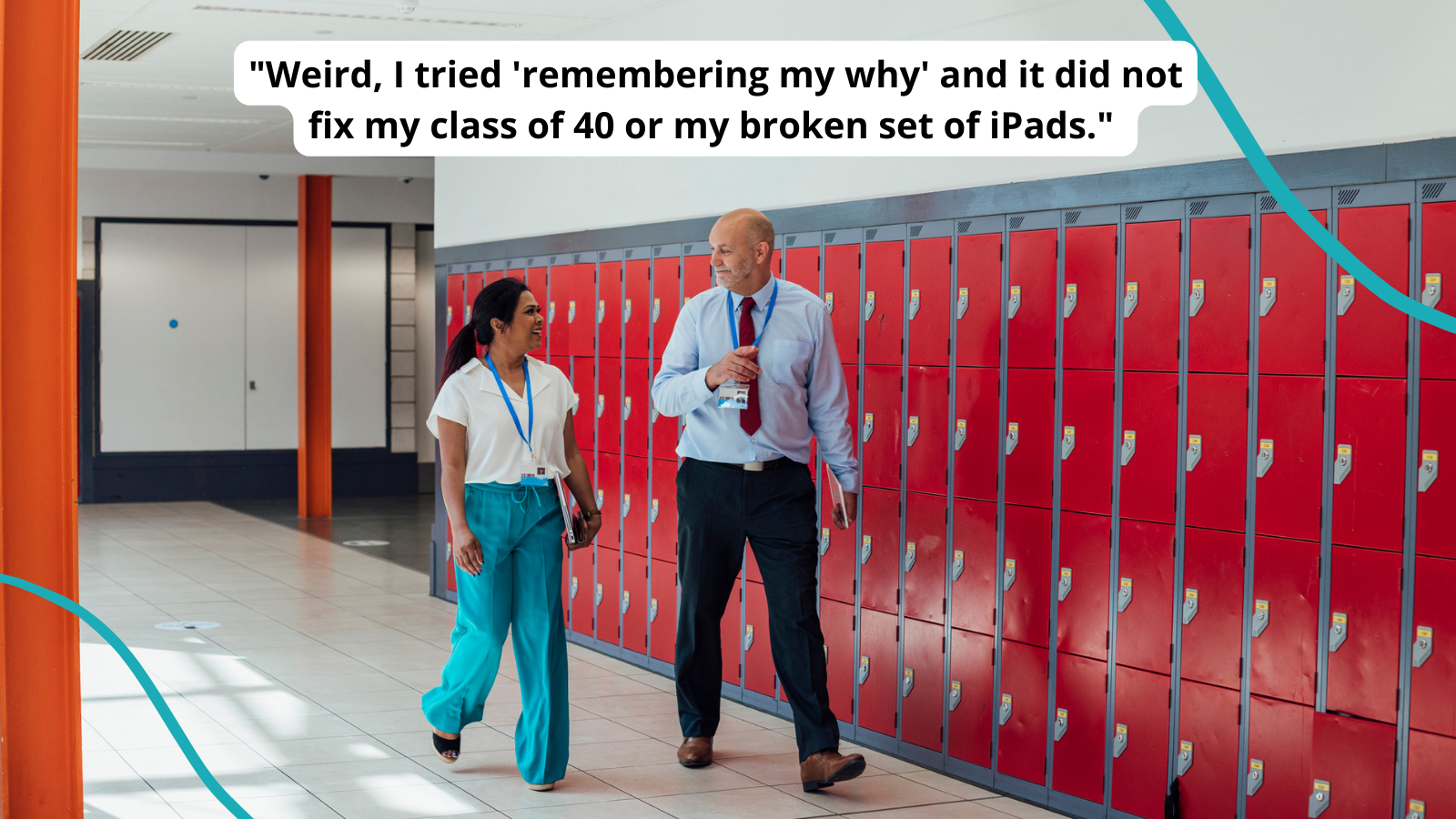Struggling with ongoing teacher and sub shortages. Hearing about “pandemic learning loss” from pundits who’ve never been teachers. Negative student behavior seemingly at a fever pitch. For many, this is teaching in 2023-2024.
And yes, Teacher Appreciation Week is nice. A cake in the teachers lounge with “Teachers Are Superheroes!” written on it is nice. Staff shout-outs are nice.
But you know what’s nicer? Adequate prep time during contract hours to plan. Salaries that allow you to focus on one job instead of looking for a second to supplement your income. And how about school cultures that don’t center on pretending negativity doesn’t exist but instead work to address its shortcomings?
There are a lot of ways we need to improve teachers’ lives, and we understand that not all of them are things a principal has control over. But one thing that every school can do regardless of their budget is crack down on toxic positivity.
What do we mean by toxic positivity?
When someone says to you “it could be worse” or “look on the bright side,” they might mean well, but what they are saying is an example of toxic positivity. Toxic positivity is when we focus on the positive and reject, deny, or displace the negative. In theory, it sounds like being optimistic, but in reality, pushing aside the unpleasant emotions does nothing to fix them and can even exacerbate them. In schools, toxic positivity may look like administrators urging teachers to take time for “self-care” but then loading them down with extra meetings and responsibilities.
It may look like someone hanging a “Teacher Strong” banner in the hallway but not paying for enough soap for the restroom. It may look like conversations that encourage teachers to “stay positive” and “remember your why” as a deflection to not have to think about, investigate, or fix the bigger issues.
This might ruffle a few feathers, but I think it’s important: In order for things to change, we have to demand it.
It starts with us.
Teachers are often people-pleasers. If we’re constantly saying yes, never questioning the decision-making from the top, and accepting treatment that keeps us miserable, we won’t get anywhere. Let’s work toward systemic change—which starts in our own schools.
Push back when you see toxic positivity being used to shut down dialogue.
Point out when your district sends a list of articles on mental health, but doesn’t also give mental health days or cover counseling in district insurance.
Ask why your district encourages a work-life balance but made sure to highlight how the district teacher of the year “never left school before 6:30 p.m.”
When your principal gives a heated talk on “leaving your negativity at the door,” schedule an appointment and ask how positive change happens without conflict.
It’s time to shift the culture from “I’m happy to perform unpaid labor and be treated like a babysitter” to “I love my job, but I’m an educated professional with boundaries.” Here are five red flags that indicate your school needs a culture glow-up.
[contextly_auto_sidebar]
1. Feeling obligated to stay at school beyond contract hours
To be clear, many teachers get to school early or stay late because it works better for their schedule. And that’s fine. But staying late because of pressure or fear that you won’t be seen as committed has to stop. If you’re a veteran teacher at your school, set the example for younger teachers of healthy boundaries. Personal life and loved ones need to come before school every time.
2. Taking work home
In my first year of teaching, I graded essays on Christmas Eve. I kept student papers in my bag so that if I waited in line at the grocery store or the coffee shop, I could pull them out and get some grading done. What a way to live. If you’re behind, ask for a substitute for a day (and not out of your own bank of days). Declare a silent reading day once a quarter to catch up.
Work hard … during hours you are paid to do so. If you don’t have enough time in the hours you are paid to do your job, that is your school and district’s fault and responsibility to fix.
3. Accepting the curse of competence
Teachers are often pressured to take on more roles, head more committees, and do extra work “because you’re so good at it!”
Start responding, “I’m happy to train [someone else] to be just as good as me.”
In addition to being punished for being good at your job, there’s another imbalance when it comes to competence. I get really fired up about tasks that are seen as more “womanly” (this happens in other workplaces too). In addition to the entire full-time job they have, female teachers are often held to these standards that we don’t ask of male coworkers: Organizing celebrations for staff birthdays. Creating Instagram-worthy classrooms. Tasks involving significant creativity, organization, coordination, cooking, or cleaning. I’ll stop there so I don’t veer into a completely different article. (Obviously #notallmaleteachers.)
There’s nothing wrong with taking on more because you want to. But if you find yourself asking “Why am I always the go-to?” stop agreeing to be the go-to.
4. Glorifying exhaustion
How many faculty meetings have started with a colleague sharing, “I was working all weekend to get ready for this week!” or “I barely slept last night because I had so much to do!” What if we wore boundaries as a badge of honor? What if we created a culture where we recognized teachers for bringing their best selves to work instead of their most depleted?
5. Using “it’s a calling” to justify bad conditions
I think a job can also be a calling. But those lines get blurred when we tell ourselves we have to endure suffering with a cheerful heart, as if we’re missionaries or aid workers in a humanitarian crisis.
We’re not. We are professionals. And we do not have to suffer to have meaning. (In fact, I think we could make the case that we could have a much greater impact on kids if we weren’t held to unbelievably high standards while given unbelievably low support.)
The years that I taught in a classroom are some of my proudest. But when I look back on my teaching self, who worked instead of slept, cried in the car, and missed her kids’ parent-teacher conferences because she didn’t have the guts to end her own on time, I feel sad. I was the “yes” teacher and the “I should be doing more” teacher when I was already giving the world.
You can care about your students, be an amazing teacher who loves their job, and also leave school at the bell.
If I had, I might still be teaching.
Have you experienced toxic positivity in schools? Tell us about it in the comments.
Plus, for more articles like this, be sure to subscribe to our newsletters to find out when they’re posted.

WeAreTeachers

